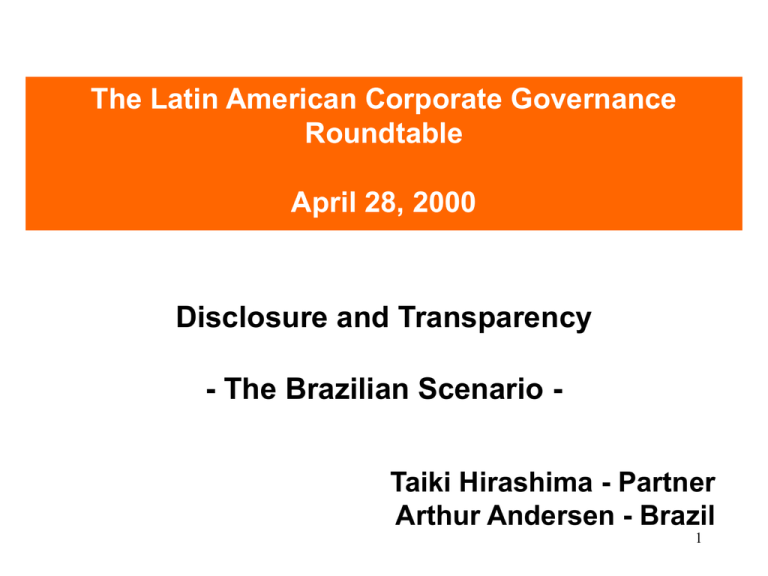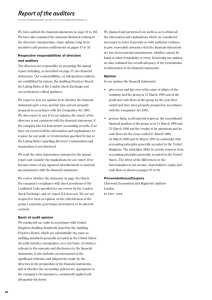Disclosure and Transparency - The Brazilian Scenario - Roundtable
advertisement

The Latin American Corporate Governance Roundtable April 28, 2000 Disclosure and Transparency - The Brazilian Scenario Taiki Hirashima - Partner Arthur Andersen - Brazil 1 Disclosure and Transparency: Topics Related to Brazil • Accounting and reporting standards - Background • Financial reporting practices • Brazilian accounting standards compared to IAS • Proposed new accounting standards - corporate law • The independent auditors and Board of Directors desirable communication • Summary 2 Accounting and Reporting Standards - Background 1. Tax legislation; 2. 1976 corporate law; 3.Hyperinflation and requirement of full price-level adjusted financials for publicly traded companies (late 80’s); 4. Economic plans - impact on tax legislation and corporate law; 5. The role of accounting profession and regulators. 3 Financial Reporting Practices Two Standards (1) 1. Brazilian corporate law standards: • Inflation accounting prohibited as from January 1, 1996; • Valid for all legal and tax purposes; • Required for CVM reporting; • The auditors’ report. 4 Financial Reporting Practices Two Standards (2) 2. Brazilian GAAP - accounting profession standards • Requires price-level adjusted financials if inflation effects are significant; • Required for SEC reporting; • “Allowed” as supplementary information for CVM reporting; • The auditors’ report. 5 Financial Reporting Practices Two Standards (3) • ADR holders are receiving different set of financial statements in relation to those published locally. 6 Brazilian GAAP Main differences from IAS • Cash Flow - not part of basic financials • Pension Benefits - cash basis • Leasing Accounting - expensing of lease payments • Segment Information - not disclosed • Purchase accounting - book value of the acquired company • Consolidation - closely held companies • Others 7 Proposed Changes in the Corporate Law Accounting and Reporting Matters (1) Main changes: • Cash flow as a basic financial statement; • Segment information disclosure; • Accounting records for compliance with tax or special legislation adjusted for financial reporting; 8 Proposed Changes in the Corporate Law Accounting and Reporting Matters (2) • Leasing accounting; • Pension accounting; • Deferral of unrealized profits on intercompany transactions; • Discounting of long-term receivable and payable; 9 Proposed Changes in the Corporate Law Accounting and Reporting Matters (3) • Income statement to reflect: • Prior year adjustment; • Extraordinary items; • Consolidation of subsidiaries, regardless of the current 30% limit; • Purchase accounting - assets and liabilities accounted for at their fair values. 10 Proposed changes in the corporate law General (4) 1. Closely held companies with assets over R$ 120 millions (+/- US$ 67,000 millions) or gross revenues over R$ 150 millions (+/- US$ 83,000 millions) are required to follow the same accounting and reporting standards applicable to the publicly traded companies, and publish their audited financial statements. 11 Proposed changes in the corporate law General (5) 2. Provides for qualification of not-for-profit entities dedicated to research and publication of accounting and auditing principles, norms and standards, as civil society organization of public interest, when certain conditions are met. 12 Proposed changes in the corporate law General (6) • Deliberative bodies composed by representatives from segments involved in the preparation, auditing and analysis of financial statements and from universities and accounting research institutes. • Due exposure and approval process for the pronouncements. The published standards may be partially or fully adopted by the CVM and other regulators. 13 The Board of Directors and the Independent auditors - Communication • The selection process; • Review and evaluation of the annual audit plan; • Review and evaluation of the audit results; • Performance evaluation. 14 The Board of Directors and the Independent auditors - areas of concern • Fraud and illegal acts; • Quality of internal controls; • Quality of financial statements and disclosures; • Accounting polices; • Management judgments and accounting estimates; • Sensitive disclosures; • Areas of disagreement with independent auditors. • The auditors’ report. 15 Summary 1. Accounting profession and regulators need to resolve the dual reporting practices 2. Changes in the corporate law need to be approved by the Congress 3. Board of Directors (Audit Committee) and independent auditors to improve communication. 4. Immediate creation of the Brazilian “FASB” to harmonize accounting and auditing standards in Brazil (IASC/IFAC guidelines as benchmarks). 16

